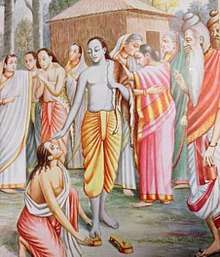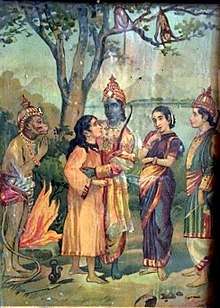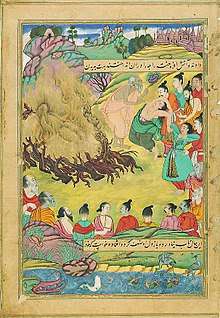Bharata (Ramayana)
| Bharata | |
|---|---|
 Bharata asks for Rama's paduka (footwear) | |
| Personal information | |
| Consort | Mandavi |
| Children |
Taksha Pushkala[1] |
| Parents |
|
| Siblings | Rama, Lakshmana, Shatrughna (half-brothers) Shanta (half-sister) |
| Dynasty | Raghuvamsa |
Bharata (/ˈbʌrətə/; Sanskrit: भरत, IAST: Bharata) is a Hindu deity depicted in the epic poem, Ramayana. According to the poem Bharata was the younger half brother of Lord Rama. Ramayana holds Bharata as a symbol of dharma and idealism.
According to the Ramayana, Rama is the seventh avatar of Vishnu while Lakshmana, Bharata and Shatrughna are considered as part-incarnations of Sheshanaga, Sudarshana chakra and Shankha respectively.[2]
Etymology
Bharatá is a Vedic Sanskrit word. Monier Monier-Williams states that it means "to be or being maintained."[3]
Role in the Ramayana


In the Ramayana Bharata, the eldest son of Dasharatha and Kakeyi and half-brother of Rama, served as the king of Ayodhya as a sage for the 14 years of Rama, Sita and Lakshman's exile. His mother was the reason that Lord Ram was exiled, since she wished Bharat to become the King instead of Ram. Bharat was sad with his mother's act. He also attempted to bring Rama back to Ayodhya after his family sage Vashisht advised him to ascend the throne. He never sat on the throne instead he brought the paduka of Lord Ram and placed them on the throne. After 11,000 years of Rama's rule, Bharata also merges with Rama's Mahavishnu form followed by Shatrughana.
Notes
- ↑ Ramayana - Conclusion, translated by Romesh C. Dutt (1899)
- ↑ Naidu, S. Shankar Raju; Kampar, Tulasīdāsa (1971). A comparative study of Kamba Ramayanam and Tulasi Ramayan. Shank. University of Madras. pp. 44, 148. Retrieved 2009-12-21.
- ↑ Monier Monier-Williams, भरत, Sanskrit English Dictionary with Etymology, Oxford University Press, page 747
See also
References
- Ramayana , translated in English by Griffith, from Project Gutenberg
- Poddar, Hanuman Prasad (2001), Balkand, 94 (in Awadhi and Hindi), Gorakhpur: Gita Press, ISBN 81-293-0406-6, archived from the original on 13 July 2010
- Bhalla, Prem P. (1 January 2009), The Story Of Sri Ram, Peacock Books, ISBN 978-81-248-0191-8
External links
| Wikimedia Commons has media related to Bharata (Ramayana). |
.jpg)
